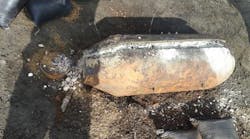Unexploded bombs are and will remain a serious threat to civil security in many parts of the world. To be able to deactivate these bombs more safely in the future, Laser Zentrum Hannover (LZH; Germany) is working on a laser-based bomb-defusing method together with Laser on Demand (Burgdorf, Germany) and the Kampfmittelräumdienst Hamburg (KRD).
The challenges and dangers of conventional defusing methods are enormous and still highly topical: The amount of weapons hidden underground in Germany is difficult to predict, but according to KRD estimates, about 60,000 tons are still in the ground. During the defusing process there is an extremely high risk of unwanted detonation, especially in complex ignition systems. Often blowing up the dud remains as a last resort.
Weakening of the casing takes explosive power
In the DEFLAG project, the project partners LZH and Laser on Demand are working on a procedure to defuse the bombs by targeted deflagration. In contrast to a detonation, a lower pressure wave is created during deflagration and the explosive is converted only to a small extent. The project partners notch the bomb casing with laser radiation and trigger the deflagration in a second step. In cooperation with the KRD, a field-compatible and automated processing platform is to be created to safely defuse even dangerous unexploded bombs.
Mobile, safe, and reliable
Essential for the project is not to exceed a critical temperature limit on the underside of the material, to drive out material from the ablation groove and to ensure process mobility. Scientists at LZH have so far been able to notch up to 25-mm-thick steel sheets using a combined melting and flame removal process. In doing so, they achieve an ablation depth of up to 16 mm with an external gas supply.
At the Hannover Messe 2018 from April 23rd to 27th (which covers industrial technology of many types), LZH will be showcasing processed bomb shells at the Pavilion of the State of Lower Saxony (hall 2, stand A08).
The LZH will show this exhibit also at LASYS in Stuttgart from June 5th to 7th, 2018.
The DEFLAG project "Safe Deflagration of Duds by Laser Technology" is being funded by the German Federal Ministry of Education and Research within the scope of the Federal Administrations "Research for Civil Security 2012-2017" program. The fire department Hamburg / bomb disposal team is the associated partner.

John Wallace | Senior Technical Editor (1998-2022)
John Wallace was with Laser Focus World for nearly 25 years, retiring in late June 2022. He obtained a bachelor's degree in mechanical engineering and physics at Rutgers University and a master's in optical engineering at the University of Rochester. Before becoming an editor, John worked as an engineer at RCA, Exxon, Eastman Kodak, and GCA Corporation.
